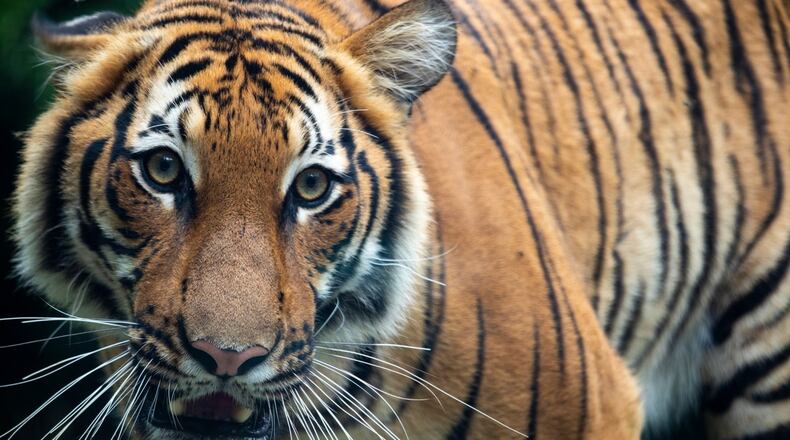Chira was named after her earliest health struggle: When she was a cub, she needed an unusual veterinary visit from Cincinnati chiropractor Mark Sperbeck to help straighten her spine.
She and her sisters, Batari and Izzy, had all been rejected by their mother shortly after their birth in 2017, leaving their upbringing to human keepers and the zoo’s longtime nanny dog, Blakely. The trauma of their birth likely contributed to her spinal problems, according to Sperbeck.
Because Malayan tigers are critically endangered, per the international Red List of Threatened Species, zookeepers hoped the trio could eventually have cubs of their own and contribute to their species’ survival.
But Chira began experiencing seizures around the time of her second birthday. The zoo sent her for a veterinary MRI, which provided no information about their cause — it was not a physical abnormality, according to zoo veterinarian Mark Campbell. The zoo requested that visitors avoid flash photography when taking pictures of her, temporarily separated her from her sisters and removed potentially dangerous items from Chira’s enclosure.
Chira was eventually diagnosed with epilepsy and put on multiple medications to help manage her seizures, according to the zoo’s blog post commemorating International Tiger Day 2020.
Despite her health problems, her keeper wrote, “she still loved to interact with keepers during training sessions. She still loved to roll her whole body in paint whenever we painted with her. She still climbed to the top of her enrichment pole to get her bunny (the first of her sisters to do so). Nothing could stop her doing what she wanted and what she loved. Even when she didn’t always feel her best, she would still chuff (a happy tiger noise) more than any other tiger earning her the nickname ‘Chuffers.’”
Her epilepsy also made her a unique animal ambassador to visitors with epilepsy, according to her keeper.
“Chira made a huge impact on everyone who met her,” the keeper wrote. “All the keepers and vets grew so close to her through her many procedures and medical training sessions. There were times she felt awful and didn’t want any food and yet still did all her training to help us take the best care of her possible. I’ve had so many guests tell me about their experiences with epilepsy and how Chira inspired them. She was truly one of our greatest ambassadors and to say she will be missed is an understatement.
“This was one of the hardest goodbyes I’ve ever had to make and yet I am so happy I had the chance to work with her. She taught me to make the best out of every situation and to never stop chuffing.”
About the Author
